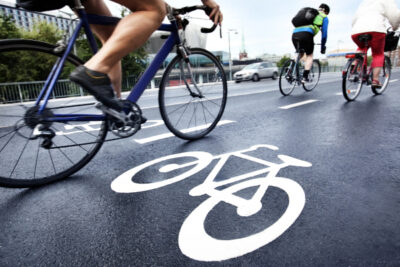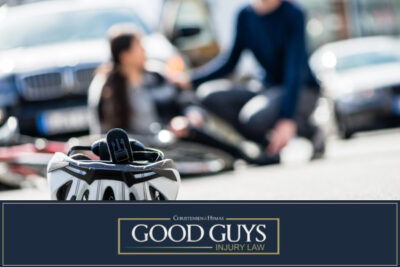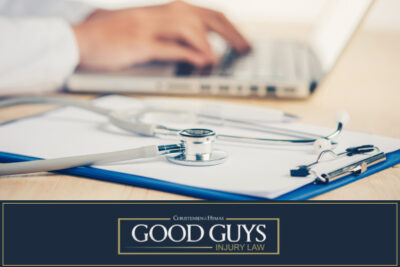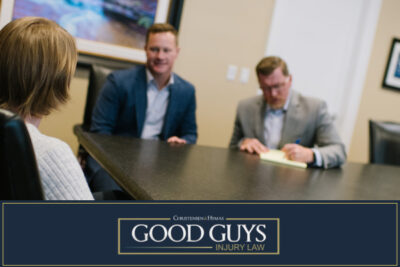
At Good Guys Injury Law, we recognize how a bike accident can be a challenging experience. Proving fault is essential to getting the compensation you deserve, and we’re here to help every step of the way.
As a Utah-based law firm, we’re proud to have a reliable legal support team that ensures you feel informed and confident throughout the process.
Let’s dive into how you can prove fault in a bicycle accident case and improve your chances for financial compensation.
Table of Contents
Understanding Fault in Bike Accident Cases
Determining who is to blame after a bike accident can be tricky. In legal terms, fault determines who is responsible for causing the accident. Establishing fault influences your chances of recovering damages.
Proving fault can make it easier to recover a fair settlement. It ensures that the responsible party is held accountable. Once the at-fault party is held responsible, you can pursue compensation for anything related to the accident, like medical bills, lost wages, and other expenses.
Fault in bike accident cases can involve several factors. These include traffic laws, witness statements, and evidence from the scene. Evidence plays a major role since it can determine the outcome of your case.
Gathering Evidence at the Accident Scene

Evidence in a bike accident case includes photos, videos, witness statements, and police reports. It also calls for medical records and communication with the other party or insurance companies. Collecting this evidence helps build a strong case in accident reports.
- Photographs and videos: Take clear photos and videos of the accident scene, including your bike, the other vehicle, and any visible injuries. Capture the road conditions, traffic signals, and relevant signs or markings. Visual evidence like this can support your case
- Witness information: Collect contact information like names, phone numbers, and addresses from anyone who saw the accident, but be wary of exchanging sensitive information. Witness statements are an opportunity to show unbiased perspectives. Their testimony can be influential in establishing that the vehicle driver was at fault.
- Police report: Ensure the police arrive at the scene and that they file a report. The police report will include important details and an initial assessment of fault. This document can be a key piece of evidence in your case.
Using Witness Testimonies in Court
In court, witness testimonies can be a powerful tool. They provide firsthand accounts that can corroborate your story. A credible witness can help establish the other party’s negligence in a bicycle crash.
Witness testimony can be persuasive before a judge or jury, potentially leading to a favorable outcome. However, if you weren’t obeying traffic signs, the defendant or the person trying to discredit your claim can also use witnesses.
Utah Bicycle Laws
Understanding traffic laws is necessary when determining fault. In Utah, the law follows a comparative negligence rule regarding bicycle accidents.
The comparative negligence rule means that as a bicycle rider, you can still get compensated for damages even if you are partially at fault for the bike accident. However, your compensation decreases by the percentage of fault or blame.
For example, if you are 20% at fault, your compensation is reduced by 20%. You must know this rule to assess your case regarding potential compensation.
Statute of Limitations for Bike Accidents
In Utah, the statute of limitations for bike accident cases is four years. This statute means you have a four-year limit from the accident date to file a lawsuit.
Filing a claim after this period can result in your case being barred, meaning you are prevented or prohibited from taking legal action. Evidence can get lost or fade with memory, so this statute encourages those involved to present their case on time.
If you want to succeed and properly protect your rights in bicycle accidents, you should take legal action before this time frame.
Reasons for Negligence in Bike Accident Cases
Common elements that we need to demonstrate to prove negligence in a bike accident include:
- Duty of care: Every driver on the road should be mindful of others. duty of care means they must act in a way that does not harm others. In bike accidents, proving the other party had a duty of care is the first step.
- Breach of duty: A breach of duty occurs when someone acts irresponsibly and endangers other people’s lives. It is essential to show that the other party breached their duty. Distracted driving is an example of this element.
- Causation: Causation connects the breach of duty to the actual crash. We must show that the breach directly caused the accident. If there isn’t causation, proving fault can be difficult.
- Damages: An accident can easily lead to minor or severe injuries and long-term psychological effects. Damages can include medical coverage, lost wages, and emotional distress. Proving damages is necessary for compensation.
Reports and Legal Documentation
Accident reports and legal documentation play a critical role in proving fault. The police report contains an officer’s unbiased observations and conclusions about the accident.
An accident report includes the crash’s location, time, and conditions. It can also be used as evidence in legal proceedings for property damage.
Medical Records On Your Injuries

You need your medical records to prove how your injuries from the bicycle accident affected you. These records show your bicycle accident injuries’ diagnosis, treatment, and prognosis. Being seen by medical professionals will also clearly link the accident to your medical condition.
Using Medical Records to Support Your Case
An insurance company needs to see medical bills or records to be able to help you. If you want to ensure you receive compensation, this documentation is essential for your bicycle accident claim.
Using medical records to support your case is a key strategy. These records provide objective evidence of how you suffered severe injuries and how they affected your life.
To demonstrate the extent of your pain or emotional effects after the accident occurred, you need to make sure to save these documents. A bicycle accident lawyer at Good Guys Injury can help you use this evidence to craft a robust case.
Expert Witnesses and Accident Reconstruction
Expert witnesses and accident reconstruction specialists can provide valuable insights. These experts can analyze the evidence and offer professional opinions on fault, revealing each party’s speed, direction, and actions.
They can reconstruct the accident scene to show how it happened. An expert analysis of the incident can be critical in convincing a judge or jury.
Legal Procedures and Court Processes

Comprehending legal procedures and court processes is paramount. The first step is filing a claim or lawsuit, which involves gathering evidence and submitting legal documents. Knowing what to expect in court can help you prepare and feel more confident.
Filing a personal injury claim involves submitting evidence and arguments to the court. It’s essential to have all your documentation ready and filed correctly and on time. Documents include medical records, police reports, insurance coverage, and witness statements.
An experienced bicycle accident lawyer ensures you meet deadlines and maintain a strong claim.
What to Expect in a Court Trial
In a trial, both sides present their evidence and arguments. Witnesses may testify, and experts can provide analysis. All evidence is considered in court, and a decision is made based on the facts and legal standards.
A judge will discuss the circumstances surrounding the bike crash. Your compliance with traffic signals and laws will be expected or challenged to prove you weren’t liable.
At Good Guys Injury, we do everything we can to prove the negligence of vehicle drivers and recover compensation for accident victims.
Safety Tips To Avoid an Accident
If you want to make sure you are adhering to traffic signals and laws, here are some points to consider:
- Helmet use: Utah does not mandate helmet use for all cyclists, but it’s highly recommended. Wearing a helmet can prevent serious injuries. It also shows you were taking safety precautions.
- E-bike safety: E-bikes have improved transportation and encouraged a healthier lifestyle. Although it lets you ride longer distances for less effort, safety concerns have come up due to speeding, so be mindful of pedestrians in trails or lanes. If you are riding a class 2 electric-assisted bike, you aren’t allowed to have alcoholic beverages in your possession.
- Bicycle lanes: Cyclists must use designated bicycle lanes when available. This law helps keep cyclists safe and traffic orderly. Failure to use bike lanes could jeopardize your chances of recovering compensation.
- Traffic signals: Cyclists are obligated to follow all traffic signals and signs. Not stopping at red lights or stop signs is illegal for bikes. Bikes are held to the same laws as motor vehicles.
- Reflectors and lights: Bikes must have a white headlight, a red taillight or reflector, and side reflectors. These lights are recommended for riding any time when light visibility is poor. This regulation enhances visibility and safety.
- Riding outside the road: In Utah, when riding on a sidewalk, path, or roadway at a crosswalk, you have all the rights applicable to pedestrians. You must ride responsibly and avoid jeopardizing pedestrians’ safety.
- Hand signals: Cyclists have to use hand signals for turns and stops. This communication is crucial for road safety. Not using hand signals leads to bicycle accidents.
- Bicycle equipment: Bikes must be equipped with functioning brakes and a bell. Proper equipment ensures safe riding.
Common Defenses Used by Defendants
If you’re trying to prove the at-fault driver’s negligence, the other parties involved will likely try to disprove your claims. Here are some common defenses used by defendants:
- Contributory negligence: The defendant may claim you were partly at fault. It can reduce their liability if they prove you’re partially to blame.
- Lack of causation: Defendants may argue that their actions didn’t lead to the accident. They might suggest other factors were to blame.
- No duty of care: Some defendants may argue they didn’t owe you a duty of care. This defense can be countered by showing their responsibility to act safely.
- Assumption of risk: Defendants might claim you assumed the risk by biking in certain conditions. This defense is often used to shift blame.
- Unavoidable accident: This defense suggests the accident was unavoidable. The defendant may argue that external factors caused the crash.
- Pre-existing conditions: The defendant could argue that your injuries were pre-existing. Medical records showing no prior issues can help discredit this. You must document the accident’s repercussions on your injuries.
Insurance Companies and Settlements
Having to deal with insurance companies and settlements can be challenging. Insurance adjusters are likely to minimize your claim for medical costs.
Awareness of your rights and the value of your bicycle accident case is indispensable. Negotiating a fair settlement can sometimes be more beneficial than going to trial.
When to Consider Settlement vs. Trial
Deciding between a settlement or a trial will always depend on your case. Settlements can be quicker and less stressful. However, trials can sometimes end with larger settlements. Discussing your options with your lawyer can help you make the best choice.
If you need help proving negligence after a bicycle collision, an experienced attorney at Good Guys Injury Law will be your only legal help to get through your cycling accident case.
Contact Our Utah Bike Accident Lawyer for a Free Case Consultation

Good Guys Injury Law believes in providing clear and compassionate support. We aim to hold the responsible party accountable and ensure you receive fair compensation. We have unparalleled experience in bicycle accident cases and can use that experience to protect your rights.
Contact us to schedule your free consultation with our personal injury lawyer.
